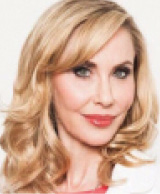Change Maker

“I’ve always been that person who believes anything is possible; and I’m very passionate about what I do and how I do it,” says Dr. Brodsky. She started her own practice because she didn’t feel she could bring about change working for someone else: “I’m somebody who likes to break through obstacles…I’m more of a practice builder than a worker bee…The only way I could see my future going was to build my own thing. Otherwise I would be constantly trying to create change with people who don’t want to change.”
As an undergraduate, Amy Brodsky, MD planned to become a biomedical engineer, but the loss of a friend in an accident her junior year shifted her focus to medicine. She hadn’t even been to a dermatologist until she was a medical student at the University of Chicago, but experience in the field helped her recognize the specialty would allow her to be “creative and use clinical skills as well as surgical skills…And because it was so visual and I’m an artist, I really like that about the profession.” Flexible hours, the typically non-urgent nature of care, and the fact that “generally, it was a happy specialty,” all added to the appeal. Today, Dr. Brodsky is founder and director of The Derm, a large practice with multiple locations in suburban Chicago.
What perspective do you bring to care as a woman and a mother?
For other women in dermatology, my patients who are young women or even teenagers, and my own children, I emphasize that it’s okay to challenge the status quo. The only person that has what you have in this world is you, and it’s a gift. You have to realize that anything is possible. I grew up with a stay-at-home mom, and my two older siblings are stay-at-home moms. So I was stepping out of my normal and embracing change. I want to teach all women that we are all imperfectly perfect. And that’s what makes us so special.
I think a lot of kids nowadays are trying so hard to be perfect, but they don’t realize that sometimes it’s okay to be imperfect. One of the things I want to bring to other women and my own daughter especially is that we have the ability to change our own narrative and our own story; we can write it in pencil and it’s up to us to change the rules at any point in our lives. In my early life, I never thought I’d be a doctor. Look at me now!
Why have you focused on pediatric sunscreen use?
I founded in 2012, the Pediatric Sun Protection Foundation with the Sun Hero initiative, and the mission was to promote sun safety behaviors in children. By using my own children as motivation, I successfully developed an educational program that made applying sunscreen and sun protective clothing an instinctual behavior for thousands of children. I supported a coalition of many charities that all helped support curing, treating, and preventing skin cancer.
I really feel like it’s important that, as dermatologists, we bring awareness more to prevention of skin disease and prevention of skin cancer. It’s a really hard message to send to people, because, unlike lung cancer or pancreatic cancer, people don’t die usually from skin cancer. It’s been very difficult to help parents and children understand that the things that you do before you’re 18 years old can affect you when you’re in your 50s, 60s, 70s. (Read more about children, sun protection, and Dr. Brodsky’s mission in the April edition of Practical Dermatology®)
I think all dermatologists should give back to their communities. We can give back in two ways: we can donate our time or we can donate money. You can teach, you can give money, you can join advocacy groups, etc.
How does your work as an artist impact patient care?
I like to use my eyes and my hands. As a painter, I see not only color, but I can see shadows and light, and dark and perspective. Dermatology is such a visual specialty. We’re not using lab values that often. We’re not using stethoscopes and otoscopes. We’re using our eyes and our hands and our brains. And that is an art in and of itself.
Then there is the cosmetic aspect—facial anatomy and facial rejuvenation. There is an art to the aging face. I understand bone structure and muscles, the nerves, veins, and arteries, but how do we put that all together and see a vision for patients so that they look better and understand proportions? That honestly, is an innate thing. To me, the syringe and the needle is the extension of the paintbrush. I inject patients’ faces like I would paint an oil picture. When I talk to the patient about their face, I always say, “When I paint, I paint the background first, and then I add the details toward the end.” That’s also the approach that I take to treating the aging face.
What do you consider your greatest personal and professional achievements?
It changes daily, weekly, monthly, yearly. Personally, I think my greatest achievement has been finding a good work-life balance as a wife, a mother, and a doctor. I believe I really have created some legacy and some change in the field of dermatology—that’s personal and professional. For professional achievement, I started out as a medical student and now I own my own practice. I have nine providers, three offices, a state-of-the-art pathology lab, and over 50 employees.
Dr. Brodsky’s 10 Tips for Women in Dermatology
(With inspiration from “The Female Doc”: thefemaledoc.com/2021/01/15/top-10-things-ive-learned-as-a-woman-in-medicine/)
1. Be you. Someone is going to find some sort of fault in you. Don’t let that limit you. Be unapologetically yourself. It seems some people are especially focused on finding fault with or tearing down women; don’t let that influence you.
2. It’s ok to self-promote. Women in particular may be feel that it’s not acceptable to self-promote, and many are socialized to not accept compliments. Be honest and authentic—which means taking credit for your accomplishments. Take a compliment when it is given, and point out your accomplishments when you need to.
3. Use your smile. It’s often said that women are more verbal than men. Use verbal communication skills to their full extent. Sometimes a bit of sarcasm can be effective to make a point while defusing a potential confrontation. Add a smile; it puts the other person at ease and relaxes their defenses, increasing the likelihood your point will be received.
4. Ask. And advocate for yourself. Generally, women in the workforce make less than their male counterparts. That we know. What’s less clear is why. Some studies suggest that women simply ask for pay increases less frequently, but data are inconsistent. Other studies suggest women approach negotiation differently, but that’s also disputed. The bottom line: you need to ask and you need to advocate for yourself. Don’t be afraid to do either, and be willing to ask for tips from peers/mentors/friends.
5. Ask for forgiveness, not permission. Leaders make decisions and they take reasonable chances. Often, they succeed (and occasionally they do not). If it’s time to follow your gut—assuming you’re not breaking rules or violating policies—then do it. Follow the old adage that it’s better to seek forgiveness for taking the chance than always seeking permission to take a chance in the first place.
6. Don’t assume other women are your friends or mentors. There may be a tendency to assume that other women in your workplace or your profession have a natural bond with you, based on shared experiences or common goals. The reality is that you cannot assume who is or is not going to be a good friend or mentor. In fact, some women may be actively disinterested in the success of other women. Identify friends and mentors based on candid assessment of their interest in and ability to support you. And don’t get hung up worrying about the “would-be” allies who are not.
7. You don’t need to be perfect. I like to say that we are perfectly imperfect. No one gets everything right every time. As a woman dermatologist, you have already shown that you are an expert in this specialty, and you have succeeded in ways that others haven’t. Give yourself credit for your success, allow yourself some mistakes, and focus on the bigger issue: using each new opportunity as a chance to learn and grow.
8. Learn to say no. Stereotypes are problematic, but they are also often based in some truth. Women are depicted as multi-taskers who, rather than say no to family, or a partner, or work, or social circle, or hobbies, simply take on more tasks and struggle for balance. Plus, there is the fear that turning down an opportunity now means turning down that opportunity forever. It is ok to say, “No” sometimes. Learning to say no can be valuable and freeing. There is nothing wrong with saying, “I can’t do this now, but please keep me in mind for the future.” Identify your priorities, and then say yes to the things that align with them.
9. Be confident. There’s something to the “fake it until you make it” mentality. Of course, you need to know your limitations and you need to be able to ask for help when it’s. That, in itself, is a sign of strength and source of confidence. Just remember that with often your attitude matters as much as what you say or do.
10. Take a seat at the table. Every person should have a voice. You’ve done the hard work. You’ve put in the long hours. Take your place and speak your mind—even if that means you need to show up without a formal invitation.








